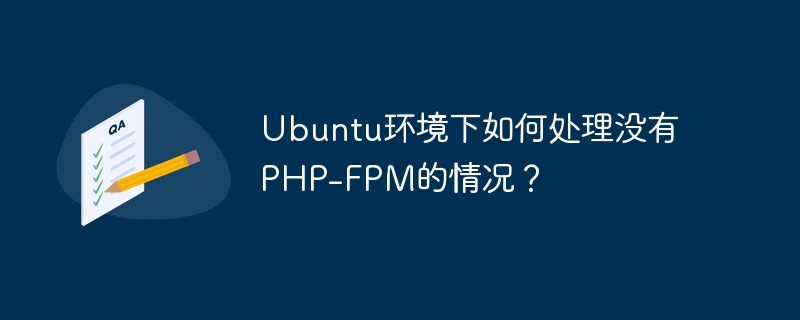Home >Backend Development >PHP Tutorial >How to deal with the situation without PHP-FPM in Ubuntu environment?
How to deal with the situation without PHP-FPM in Ubuntu environment?
- 王林Original
- 2024-03-08 12:00:061012browse

How to deal with the situation without PHP-FPM in Ubuntu environment?
In Ubuntu systems, we usually use PHP-FPM (FastCGI Process Manager) to handle requests from PHP programs, but sometimes due to various reasons, we may need to install PHP-FPM without installing it. Handle PHP programs. This article will introduce how to handle PHP programs in the Ubuntu environment without PHP-FPM, and provide specific code examples.
- Install the necessary software packages
First, we need to install the Apache server and PHP interpreter. In the Ubuntu system, you can use the following command to install:
sudo apt update sudo apt install apache2 php libapache2-mod-php
The above command will install the Apache server and PHP interpreter, as well as the module connection library for Apache and PHP.
- Configuring the Apache server
Next, we need to configure the Apache server to correctly interpret PHP programs. Edit the Apache configuration file /etc/apache2/apache2.conf and add the following content at the end of the file:
<FilesMatch .php$>
SetHandler application/x-httpd-php
</FilesMatch> This configuration tells the Apache server to transfer the .php file Leave it to the PHP interpreter.
- Configure virtual host
If you use a virtual host to host your website, you need to edit the virtual host configuration file (usually in /etc/apache2/sites- available directory), add the following content:
<VirtualHost *:80>
ServerName example.com
DocumentRoot /var/www/html
<Directory /var/www/html>
Options Indexes FollowSymLinks
AllowOverride All
Require all granted
</Directory>
</VirtualHost>This configuration specifies the root directory of the virtual host as /var/www/html, and sets permissions and access rules .
- Restart the Apache server
After completing the above configuration, you need to restart the Apache server for the configuration to take effect:
sudo systemctl restart apache2
- Test PHP parsing
Finally, create a simple PHP file info.php with the following content:
<?php phpinfo(); ?>
Place the file in the root directory of Apache /var/ Under www/html, visit http://your_domain/info.php. If you see the PHP information page, it means that the PHP parsing has taken effect.
Through the above steps, we successfully processed PHP programs in the Ubuntu environment without installing PHP-FPM. Hope this article is helpful to you.
The above is the detailed content of How to deal with the situation without PHP-FPM in Ubuntu environment?. For more information, please follow other related articles on the PHP Chinese website!

